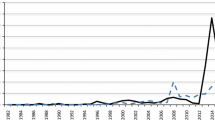
Overview
- Applies Islamic principles to a variety of major human concerns
- Includes interdisciplinary applications for Islamic ethics, law, and spirituality
- Moghul’s practical experience in Islamic banking informs his arguments
Part of the book series: Palgrave Studies in Islamic Banking, Finance, and Economics (IBFE)
Access this book
Tax calculation will be finalised at checkout
Other ways to access
About this book
This book explores how, through spirituality and the development of character, Islamic financial institutions and Muslim communities can integrate their businesses with contemporary social responsibility initiatives to produce positive social and environmental impact. From the looming environmental crisis to the divide between mainstream and extremist interpretations of Islam, the book addresses significant questions facing Muslim communities – and humanity – and demonstrates why Islam should sit ‘at the table’ with other faiths and ethical traditions discussing humanity’s great obstacles. Unlike existing literature, this work explores the intersections between classical Islamic ethics and spirituality, contemporary Islamic finance and economic markets, and select sustainability and impact initiatives (such as the Equator Principles and UN Principles of Responsible Investment) designed to make the worlds of business and finance responsible for the environments in which they operateand the communities that support them. Drawing on his years of experience in Islamic banking, Moghul addresses these applications in light of real-world practices and dilemmas, demonstrating how Islamic organizations and Muslim communities should embrace the broad range of stakeholders countenanced by the Shari’ah in conversations that affect them. By situating his exploration of Islamic finance in the light of the much larger critical issues of balance, justice, and moderation in Islamic praxis, Moghul creates an interdisciplinary book that will appeal to academics and researchers in economics, finance, business, government and policy, and law.
Similar content being viewed by others
Keywords
Table of contents (7 chapters)
-
Front Matter
-
Back Matter
Reviews
“This book’s uniqueness is its identification of intersections among classical Islamic ethics and spirituality, contemporary Islamic finance, and global responsibility initiatives. Using an authentic Shari’ah-based argument, Moghul convincingly posits that by developing individual and organizational values, Islamic finance and Muslim communities can participate in producing positive impact through business, reach the objectives of the Shari’ah, and offer its principles to others. This is, and must be, the future direction of Islamic institutions and economies.” (Shaykh Yusuf T. DeLorenzo, Dow Jones Islamic Markets Indexes)
“Umar F. Moghul has superbly integrated the ideas of spirituality, morality and Islamic finance in this must-read book on Islamic finance. As long as Islamic finance encourages individual and collective character development consistent with Shari’ah, it can present a great opportunity to grace the world with the Islamic values of equitable and stable economic growth, inclusive and trustworthy social institutions, and responsible stewardship of the environment.” (Professor M. Kabir Hassan, University of New Orleans, USA)
Authors and Affiliations
About the author
Bibliographic Information
Book Title: A Socially Responsible Islamic Finance
Book Subtitle: Character and the Common Good
Authors: Umar F. Moghul
Series Title: Palgrave Studies in Islamic Banking, Finance, and Economics
DOI: https://doi.org/10.1007/978-3-319-48841-7
Publisher: Palgrave Macmillan Cham
eBook Packages: Economics and Finance, Economics and Finance (R0)
Copyright Information: The Editor(s) (if applicable) and the Author(s) 2017
Softcover ISBN: 978-3-319-84028-4Published: 03 May 2018
eBook ISBN: 978-3-319-48841-7Published: 07 February 2017
Series ISSN: 2662-5121
Series E-ISSN: 2662-513X
Edition Number: 1
Number of Pages: XIII, 315
Topics: Financial Services, Macroeconomics/Monetary Economics//Financial Economics, Public Finance



